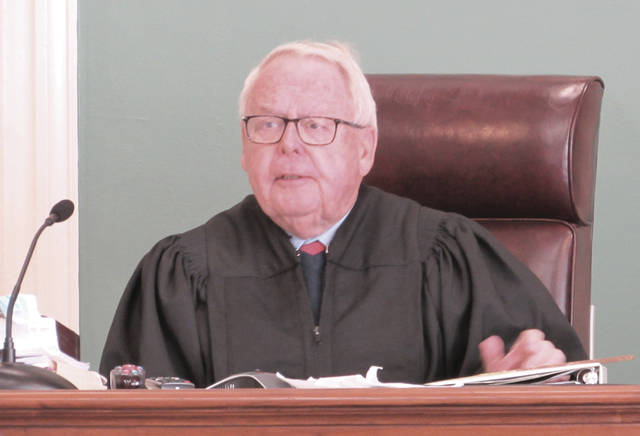

EATON — On Wednesday, May 6, former Ohio State Highway Patrol trooper Chris Ward was sentenced to three years of incarceration on charges of sexual battery and gross sexual imposition in Preble County Common Pleas Court.
Visiting Judge James A. Brogan then ordered Ward released pending appeal, saying jailing the defendant during the ongoing Covid-19 pandemic could amount to a death sentence.
“80 percent of inmates in these institutions test positive for the virus,” the retired Montgomery County judge said, referring to the prevalence of Covid-19 infections in the nation’s prisons and jails. “I won’t sentence this man to death.”
Ward, 45, of Eaton, was convicted of one count of sexual battery and three counts of gross sexual imposition in December 2019. Ward has been accused of sexual assault by at least seven women, according to prosecutors.
Sexually Violent Predator specification
One of Ward’s convictions carries a sexually violent predator specification that, if imposed by the judge, could have carried a life sentence.
Judge Brogan chose not to impose the specification, however, saying that prosecutors “had not prevailed beyond a reasonable doubt” on the issue.
Ohio Attorney General’s Office Special Prosecutor Joel King argued that Ward deserved the violent predator specification because his long history of crimes proved he was likely to reoffend.
“The evidence doesn’t suggest it. It’s been proven,” King said. “What better way to predict future behavior than to look at prior behavior?”
Defense attorney H. Steven Hobbs disagreed, citing a state-ordered psychological evaluation which found that Ward’s crimes were motivated by power and the abuse of his authority more than sex, and that Ward “became a different person when he put on his uniform.”
“We’ve taken his uniform away,” Hobbs argued. King, however, countered that there are other methods of deriving authority, stating that some of Ward’s crimes had taken place inside his home, or were committed against underage victims.
“There’s the authority of a police officer,” King said. “But there’s also the authority of a parent or adult, and the authority that ‘this is my home, and I can do what I want.’”
Request for a new trial
Ward’s attorney asked the court for a new trial on the sexual battery conviction, citing issues with the alleged victim’s eyewitness identification, as well as with information turned over to the defense by law enforcement.
The victim’s testimony, Hobbs argued, stated that she hadn’t looked at her attacker either as he approached her vehicle (the victim was allegedly assaulted by Ward after he pulled her over for a traffic violation) or during the assault itself.
Hobbs also argued that the victim identified Ward after being shown the defendant’s photograph, rather than being shown several photographs and asked to choose between them, and that the photograph used for the identification had not been presented at trial or even described. This could be especially problematic, according to Hobbs, if the photograph showed Ward wearing his police uniform.
“Highway patrol officers all look similar, in my opinion,” Hobbs said. “Similar clothing, and they wear their hair the same way.”
Though the judge agreed the circumstances surrounding the identification were troubling, he found it unlikely the victim had been assaulted by someone other than Ward.
“Either that, or there’s a person out there who’s also a police officer, and who looks like the defendant, who did it,” Brogan said.
Hobbs noted that the victim had initially identified her attacker only as a police officer, rather than as an OSHP trooper. The judge pointed out, however, that a victim in a similar case had specifically identified her assailant as a state trooper. Brogan ultimately acquitted Ward on that charge because the victim failed to appear in court to testify.
“He was acquitted because of lack of due process, not because I didn’t find her account credible,” Brogan said.
The victim in that case was also allegedly pulled over by Ward. She claimed Ward offered to “let her go” in exchange for having sex with him, saying she complied out of fear she’d be arrested if she refused.
Hobbs also alleged that prosecutors had failed to disclose the fact that two of Ward’s supposed victims had previously claimed to have been sexually assaulted, and that GPS data from Ward’s cruiser was not sufficient to rule him out in at least one of those assaults. The data provided by prosecutors covered only a three-month period in 2017, according to Hobbs, while the assault in question likely did not take place during that timeframe.
Prosecutors challenged each of Hobbs’ points, arguing that problems with the identification were an issue for an appeals court to consider, rather than grounds for a new trial; that Hobbs could have requested additional GPS information during the trial, but failed to do so; and that information on prior sexual history, including previous accusations of sexual assault, would be inadmissable in court due to Rape Shield laws, and so could not possibly have affected the outcome of the trial.
Judge Brogan ultimately denied Ward’s request for a new trial.
Victim impact statements
Minus the violent predator specification, the counts of which Ward was convicted carried a maximum combined sentence of nine and a half years. Hobbs argued for probation, saying there was “no evidence of any violence” in the case, no evidence that Ward caused serious physical harm to the victims, no evidence of torture, and that “nobody’s life was put in jeopardy.”
“We’re talking about a nine-year period in a 45-year life,” Hobbs concluded, referring to the timeframe over which Ward’s crimes are alleged to have taken place. “It’s not like it’s some tremendous ongoing problem.”
Ward’s alleged victims disagreed.
“I was personally dealing with embarrassment, worry, anger, and fear,” a prepared statement from one victim in the case reads. The statement was read aloud by a female prosecutor. “I was shocked after the incident, and I didn’t know if I should say anything because he was a state trooper. I’m sorry that Mr. Ward’s family has to suffer for his crimes, and I hope he takes responsibility for them and that his time away will not be in vain.”
A prepared statement by Regina Fischer, who previously spoke to The Register-Herald about being assaulted by Ward, was read aloud by a victim advocate.
“After you attacked me, I became isolated in my own world of fear,” Fischer’s statement reads. “Christopher Ward, you are my attacker, 100 percent. Christopher Ward, you took the last two years I had with my husband.”
Fischer also took the OSHP to task for failing to speak out about Ward’s alleged crimes.
“I hope this is a wake-up call,” Fischer wrote. “Christopher Ward violated my trust and the trust of others, and I have seen no one from the Ohio State Highway Patrol stand up and say anything to gain that trust back.”
Finally, a third alleged victim in the case — an aspiring police officer who had just finished basic training — spoke of how her colleagues in law enforcement had betrayed her.
“I always knew I wanted to work in law enforcement,” she said. “When the incident happened with Mr. Ward in 2015, it was almost as if someone pushed pause on my life. My motivation was gone for a while. It felt like I had found a dead road. No one listened to me, and in no way did anyone begin to understand what I was feeling.”
“The people I wanted to become had broken me, let me down. My voice didn’t matter to them when I asked for help,” she continued.
Sentencing and release
Judge Brogan ultimately sentenced Ward to 30 months on the sexual battery charge and six months on each count of gross sexual imposition, to be served concurrently with each other but consecutively to the sentence on the battery charge. Ward will serve a total of three years in prison, provided his convictions are ultimately upheld.
“When I grew up, when a woman walked into the room men stood up,” Brogan said before sentence was pronounced. “They tipped their hat to women in the street. It is just unbelievable the manner in which some men treat women, almost as objects.”
Brogan said that Ward “apparently had a number of years of good behavior as a highway patrolman,” however, and that statistics show convicted sex offenders often do not re-offend. He also cited Ward’s lack of any “serious criminal history.” After sentencing Ward the judge let it be known that he would grant a request for release pending the defendant’s planned appeal of the battery conviction.
“I’m concerned that if I send the defendant to jail right now, it will complicate the jobs of the people in those institutions that are pleading for help,” Brogan said. Ward’s attorney then moved for release pending appeal, which was granted.
The judge ordered Ward to report his whereabouts and activities to local authorities every two weeks until his sentence goes into effect, as well as to abstain from alcohol and illegal drugs. Ward is designated as a Tier III sex offender, meaning that he must report any address where he lives, works or goes to school to the sheriff of the applicable county every 90 days for the remainder of his life. Because his crimes involved underage victims, Ward also may not reside within 1,000 feet of a school or daycare center.



